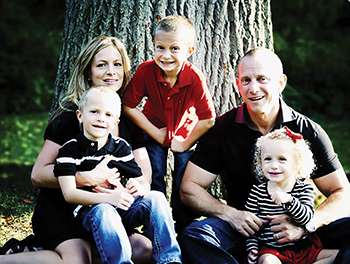Brain Tumor Survivor
Appreciate the Day
 Matt Newman likens having a Grade III astrocytoma to buying a car. You never notice all the other people who have that same car until you get yours. Today, Matt is cancer-free and living life to the absolute fullest with his wife and three children. He is also devoted to sharing the lessons he’s learned with other brain tumor survivors.
Matt Newman likens having a Grade III astrocytoma to buying a car. You never notice all the other people who have that same car until you get yours. Today, Matt is cancer-free and living life to the absolute fullest with his wife and three children. He is also devoted to sharing the lessons he’s learned with other brain tumor survivors.
As crazy as it sounds, I wouldn’t trade a single thing that’s happened to me. Having a brain tumor instantly enabled me to see life through a different lens. My life is my journey. Cancer’s just along for the ride.
This part of the ride started one snowy, icy day in 2013 when the car I was driving hydroplaned and crashed. My car was totaled, but I walked away without a scratch. The police officer at the scene encouraged me to go to the emergency room. “I’m good,” I replied in my typical type-A way. When I called my wife, Rebecca, she reminded me of a friend whose life was literally saved because of a car accident. Her ER doctor told her she should send flowers to the driver of the car who hit her because if she hadn’t come to the hospital, she would have been dead in three hours. She had a brain aneurysm. But did that shocking story convince me to go to the ER? It did not. Instead, I went home. My head was killing me, but I kept it to myself. Rebecca never complained about her migraine headaches or taking care of our three kids under 5 and her dad, who had pancreatic cancer.
For the next week, I had intense head pain and lost the ability to sleep. A few weeks later, I had the first of 11 stroke-like events. The last one happened four months later when I was giving a work presentation. I started to make a point, and all that came out was slurring and gurgling. I knew it was time to get to the hospital. I called Rebecca, and she met me there.
After running several tests, the doctor said I had a lesion on my brain. Just eight days earlier, I’d finished a 10-mile run. I was in great physical condition. Then I remembered the car accident and assumed I’d hit my head harder than I thought.
Rebecca ran home to make lunch for the kids while I waited to have an MRI. When the nurse arrived to take me for the test, she had a wheelchair. I told her I could walk, but she said it was protocol. As she wheeled me out of the room, she said, “We need to find out how big your brain tumor is.”
I heard that and just started to cry. I allowed myself to have a pity party that day only, then I looked inside to grab the strength I needed.
The doctor recommended a craniotomy to remove the tumor. My best friend, a pediatric anesthesiologist, and one of his colleagues called my doctor to discuss the treatment plan. My friend assured me I was in the right place with the right team.
The doctor took out the tumor during the craniotomy. I went home two days later to “Welcome home, Daddy” signs. Five days after that, I walked my daughter into her classroom. To her, I was doing what dads do. To me, I was making a memory, and I guarantee I didn’t think that way before my diagnosis.
The pathology results showed the tumor was a Grade III astrocytoma, and my doctor suggested chemotherapy and radiation therapy.
Chemotherapy humbled me. I lost my hair and my taste buds, but I gained strength from my father-in-law. We were cancer partners, and I learned grace and humility from him. It was calming just to sit next to him watching a ballgame. We didn’t have to talk. Sometimes a simple nod was the extent of our conversation. We lost him physically, but not spiritually, 15 months after I was diagnosed.
I had six weeks of radiation, coupled with chemotherapy. As the lethargy set in, I found that being physically fit paid off. I didn’t have the energy I did before, but I still worked and exercised every day.
During treatment, I wrote messages to my friends and family as a way to release pent-up nerves and anxiety. It was cathartic for me. After realizing the messages were going to more than 20,000 people and helping them, too, I wrote “Starting at the Finish Line,” a book about the lessons I’ve learned from this disease. I’m also involved with Head for the Cure, an organization that raises awareness and funding to inspire hope for the community of brain cancer patients, their families, friends, caregivers and other supporters, while celebrating their courage, spirit and energy. That kind of support is invaluable. Rebecca never skipped a beat when she was caring for me. She was always there, doing whatever I needed.
I have scans every four months because the doctors say there is a good chance the tumor can come back, but I don’t let that affect my life. It is my journey. My perspective changed my understanding of the fragility of life and my appreciation of the now are what I took from cancer. I own them. Cancer will never define my legacy — I will!
This moment right now is yours. Hug your kids. Enjoy your life.


